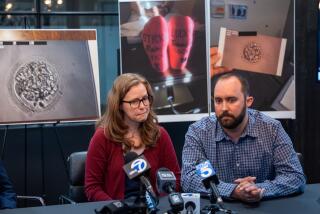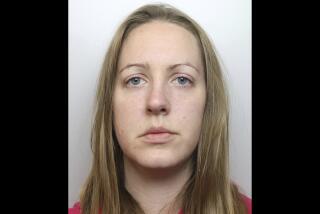Trial to Begin for Obstetrician in Deaths of 8 Infants, 1 Fetus
- Share via
Nearly 2 1/2 years after his arrest, a Valencia obstetrician is scheduled to go on trial today on second-degree murder charges, accusing him of responsibility for the deaths of eight infants and a fetus.
Milos Klvana, 47, is being prosecuted on charges that he proceeded with high-risk deliveries--and bungled them--despite knowing that he did not have the skill or the equipment to perform them safely at his obstetrical clinics in Valencia and Temple City, according to the prosecutor, Deputy Dist. Atty. Brian R. Kelberg.
For the record:
12:00 a.m. April 6, 1989 For The Record
Los Angeles Times Thursday April 6, 1989 Home Edition Part 1 Page 2 Column 6 Metro Desk 2 inches; 57 words Type of Material: Correction
An article on Tuesday contained errors about the second-degree murder trial of Dr. Milos Klvana and his assistant, Delores Doyle. Klvana, after representing himself through much of the pre-trial proceedings, now is represented by court-appointed attorneys Rita-Jane Baird and Richard A. Leonard. Doyle is charged with three counts of second-degree murder and is being held in lieu of $100,000 bail.
Klvana’s sometime assistant, Delores Doyle, 36, of Montclair, is being tried with the doctor on two counts of second-degree murder and one count of involuntary manslaughter. Klvana and Doyle are also being tried on charges of insurance fraud and grand theft.
Klvana is representing himself with the aid of two court-appointed advisory lawyers, Rita-Jane Baird and Richard A. Leonard. His defense so far has been an attack on Kelberg, who the doctor said is obsessed with the case and is singling him out for prosecution because his practice of avoiding hospitals is unorthodox. Klvana is being held in County Jail in lieu of $750,000 bail.
Claims Secondary Role
Doyle, who is being held in lieu of $200,000 bail, is being represented by Maxwell S. Keith. Keith has argued in pretrial motions that Doyle played only a secondary role in the deliveries and should not be charged with murder. He said Klvana, as the doctor, bears the final responsibility for the care of the mothers and the babies.
The trial is expected to last more than a year. Included among about 400 witnesses are medical experts, friends of Klvana and parents of the dead infants. The court record will include thousands of pages of exhibits, which Kelberg has said occupy 45 boxes in his office. The preliminary hearing for Klvana and Doyle lasted four months in 1987.
With opening statements to begin today, the district attorney’s staff set up a video camera and six television sets Monday in the courtroom of Los Angeles Superior Court Judge Judith C. Chirlin so court personnel and jurors can read the documents on the screens.
The crux of the case is the prosecution’s argument that Klvana knew that deaths or stillbirths could result from his decisions not to recommend hospitalization for the mothers in the nine deaths between 1982 and 1986. The legal theory is one of “implied malice,” which is used in murder prosecutions against drunk drivers who cause deaths despite previously having been convicted of drunk driving.
“The charge is not that he has an intent to kill any one of these babies or to harm intentionally the mother or baby, but that he acts with a subjective awareness of the complications associated with these high-risk cases,” Kelberg said.
The high-risk cases included an insulin-dependent diabetic mother. Infants in such cases sometimes are born prematurely with underdeveloped lungs, necessitating close monitoring in a hospital, Kelberg said. He said Klvana’s decision not to have Debbie Friel deliver in a hospital resulted in the death of her son, Jason, a day after his birth in 1984.
Another high-risk situation alleged by Kelberg is known as “RH sensitization” in which a conflict of blood factors between mother and child causes the mother’s immune system to treat the fetus as a foreign invader. Blood tests before delivery can detect this condition so it can be treated with a drug. But in the cases of two deliveries by Mira Ginsberg in 1982 and 1984, no such tests or treatments were done, resulting in a stillbirth and an infant’s death one day after birth, according to court documents.
A third condition expected to be cited at the trial is known as “meconium staining.” Meconium, or fecal matter, can kill the fetus if ingested. Kelberg has said in court papers that during Kim Ennis’ labor in 1984, Klvana and Doyle noticed stains of meconium, indicating trouble, but did nothing to extract the material from baby Tyrone Ennis’ lungs and did not send him to a hospital. The boy died seven days later.
“The simple fact is that all of the cases involve common textbook obstetrical complications . . . mandating transfer of each mother prior to delivery to a hospital setting,” Kelberg said.
More to Read
Sign up for Essential California
The most important California stories and recommendations in your inbox every morning.
You may occasionally receive promotional content from the Los Angeles Times.













